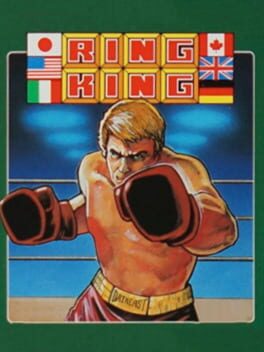

Challenge your friends or your computer to the Data East Championship Title Bout! Challengers from around the globe, each with his own style of boxing, knuckle up to take the title. Win by knock-out or points using a wild assortment of hooks, jabs, uppercuts, and combinations!
Reviews View More
As one of Data East's first titles, Ring King appears to be a boxing simulation with a more realistic look than most titles of its time. Data East had already more or less tried their hand at the genre with Tag Team Wrestling (1984), whose NES port was itself particularly abysmal. Here, the emphasis is on movement and management of the stamina bar rather than reflexes. One of the particularities of the title is the impossibility of controlling the boxer's movements in an absolute way: he moves relative to his opponent, which limits his movements to moving forward, backward or spinning around him. The inherent problem with this mechanism is that it is difficult to control the exact distance to the opponent to make an attack.
This concern is exacerbated by the ridiculousness of the animations. Unlike Punch-Out!! (1987), which, later on, made the choice of exaggerated and rather dodge-friendly fights, Ring King leaves almost no chance to dodge or to guard against an opponent's attack, as it hits instantly with no start-up animation. The B button is supposed to be for guarding or dodging, but it's hard to make the correct and intended move and doesn't guarantee a good defence. Similarly, the attack sequences are very frustrating, as the AI is able to avoid blows with ease, rendering a cautious approach ineffective; yet it is this approach that is encouraged, as attacking drains our stamina bar – which also serves as a life bar. In fact, the frustrated player easily finds themselves chaining rains of blows, hoping to connect at some point, at the cost of a rapidly falling stamina. The whole thing gives a muddled impression, as fights always seem biased against the player.
Yet Ring King is not without interesting ideas. The self-assigned stats is a good proposition, but the game forces you to go through the Training mode to improve these stats before even starting what appears to be the main mode (Ranking). The graphics are rather charming and detailed for a game of this era, with a successful cartoon feel, but they mostly hurt visibility and make it difficult to estimate distances. Ring King thus strikes as a title too ambitious, too complex and too badly designed to work. It's a pity and it somewhat explains that the winning formula of Punch-Out!! eventually led boxing games in another direction.
This concern is exacerbated by the ridiculousness of the animations. Unlike Punch-Out!! (1987), which, later on, made the choice of exaggerated and rather dodge-friendly fights, Ring King leaves almost no chance to dodge or to guard against an opponent's attack, as it hits instantly with no start-up animation. The B button is supposed to be for guarding or dodging, but it's hard to make the correct and intended move and doesn't guarantee a good defence. Similarly, the attack sequences are very frustrating, as the AI is able to avoid blows with ease, rendering a cautious approach ineffective; yet it is this approach that is encouraged, as attacking drains our stamina bar – which also serves as a life bar. In fact, the frustrated player easily finds themselves chaining rains of blows, hoping to connect at some point, at the cost of a rapidly falling stamina. The whole thing gives a muddled impression, as fights always seem biased against the player.
Yet Ring King is not without interesting ideas. The self-assigned stats is a good proposition, but the game forces you to go through the Training mode to improve these stats before even starting what appears to be the main mode (Ranking). The graphics are rather charming and detailed for a game of this era, with a successful cartoon feel, but they mostly hurt visibility and make it difficult to estimate distances. Ring King thus strikes as a title too ambitious, too complex and too badly designed to work. It's a pity and it somewhat explains that the winning formula of Punch-Out!! eventually led boxing games in another direction.
